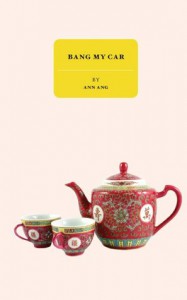Words, Words, Words
A catalog of my comments and thoughts on books, reading, and writing as well as anything I come across that seems interesting. I used to sell other people's words at an independent bookstore but now I hope to get by on selling my own.
'Bang My Car' by Ann Ang

Bang My Car was gifted to me by a friend returning from a work trip in Singapore. I am not sure what linked me to this book in their mind but I am glad things worked out as they did. Bang my Car is a short story collection dealing most notably with language in Singapore, specifically the use and acceptance of "Singlish," an English dialect particular to that country. But, as language goes so goes identity, politics, economics, and family, all of which come through in this collection.
I, like the dust jacket and the intro, make a lot of the use of Singlish, but the language isn't any more difficult than Junot Diaz [for non-Spanish speakers]. The language represents one facet of concerns across generations and classes about identity. Ang writes a lot about family, with the parents representing a westernized post-industrial economy driven by the need to work and improve their station while older generations pushing against these foreign influences. It's the older "uncles" usually speaking in Singlish, where the parents are interested in wine, violin lessons, and schooling. And we observe from the perspective of the youth, uncertain what to make of it all.
Many of the stories are written in the second person, often an old man ranting at the "you" [in the person of some neighbor or party in a care accident]. The effect can be alienating, like watching a subject under glass. The remove is most obvious in "Imaginary Geographies of the Singapore Heartland" where interviews with an unidentified man are dissected and analyzed through an academic lens. But while other stories skip the analysis, the anonymity and one-sidedness seem more like a person being watched than an interactive experience.
I'm a sucker for stories about language. Hollywood loves films about Hollywood, news companies love stories about news, and I love stories that interrogate our relationship with language. Ang's stories try to capture the intricacies of Singlish, but also probe it and the society from which it comes. What does it say when a person chooses to speak Singlish or to speak English for that matter? These questions are being asked all over the world; they can be as wide as the conversations between nations and be as intimate as a person understanding their own identity. But as Ang illustrates, the battles themselves are played out thousands of times a day in small interactions: a survey-taker and an old man, a father and his father, a man complaining to his neighbor about people of a different ethnicity moving to their area. There are plenty of people trying to decode the major events of the day, and they sometimes seem right for a moment. Ang focuses us on the small questions, the ones that persist and point to something bigger.
 2
2
